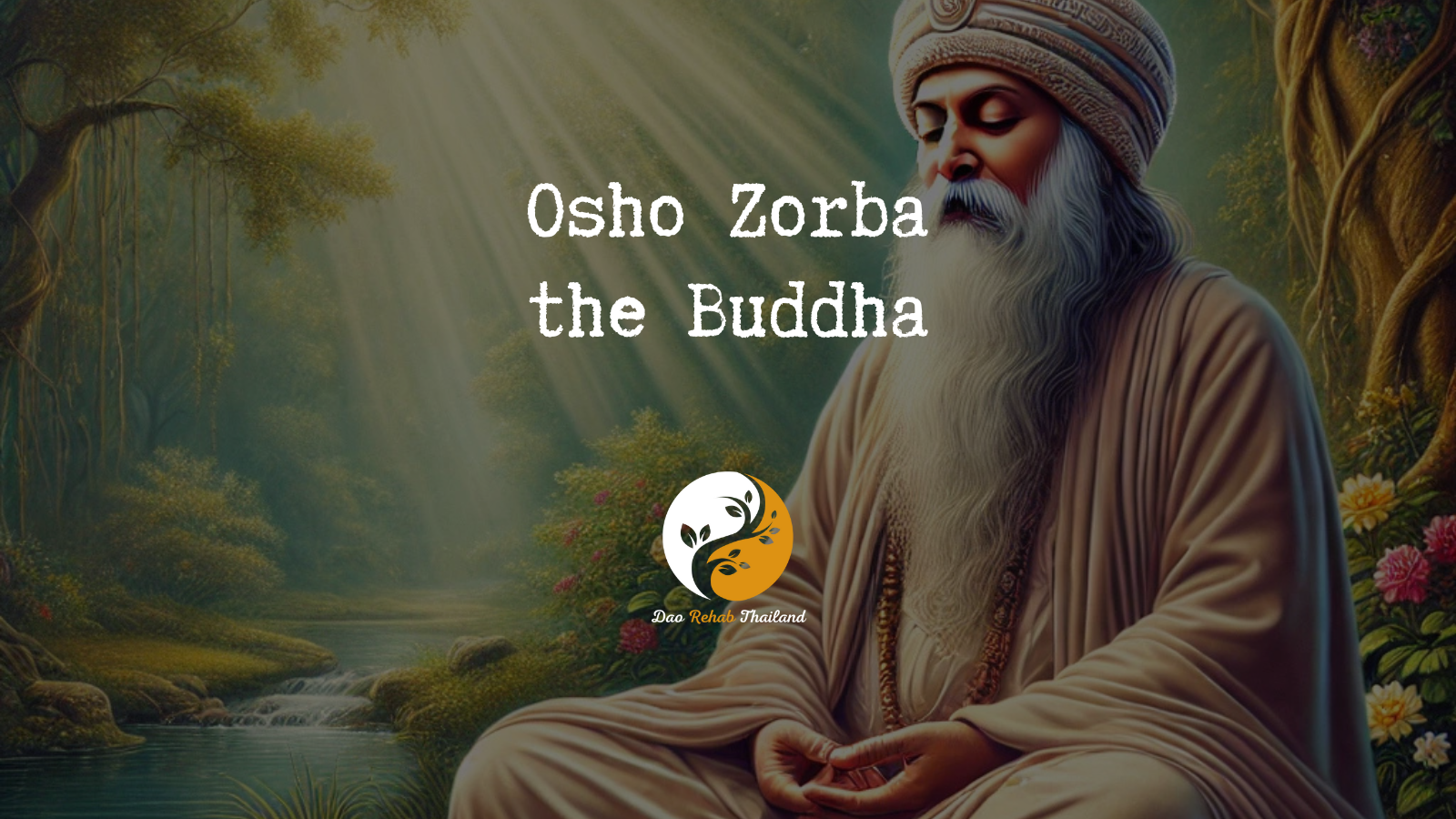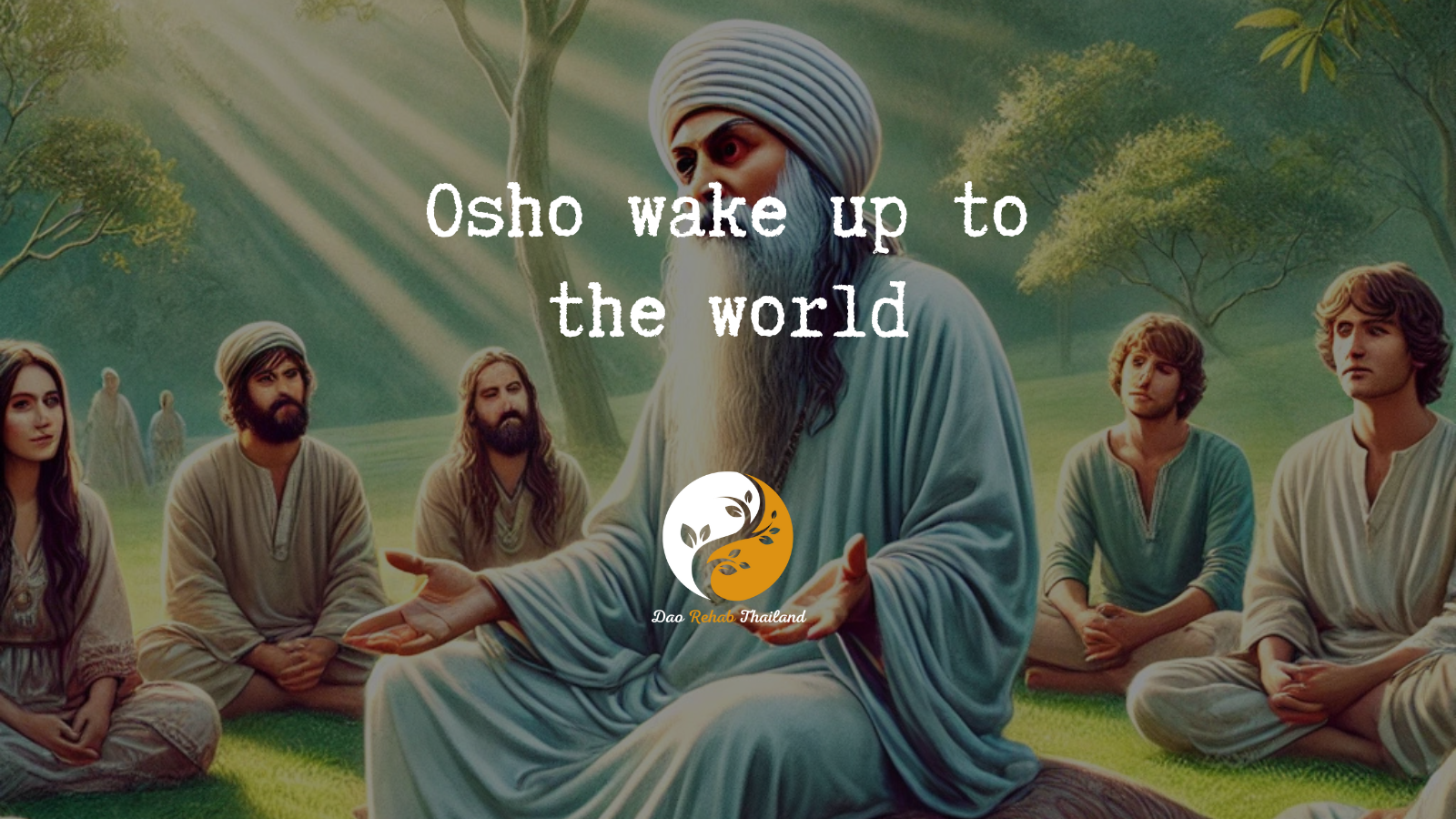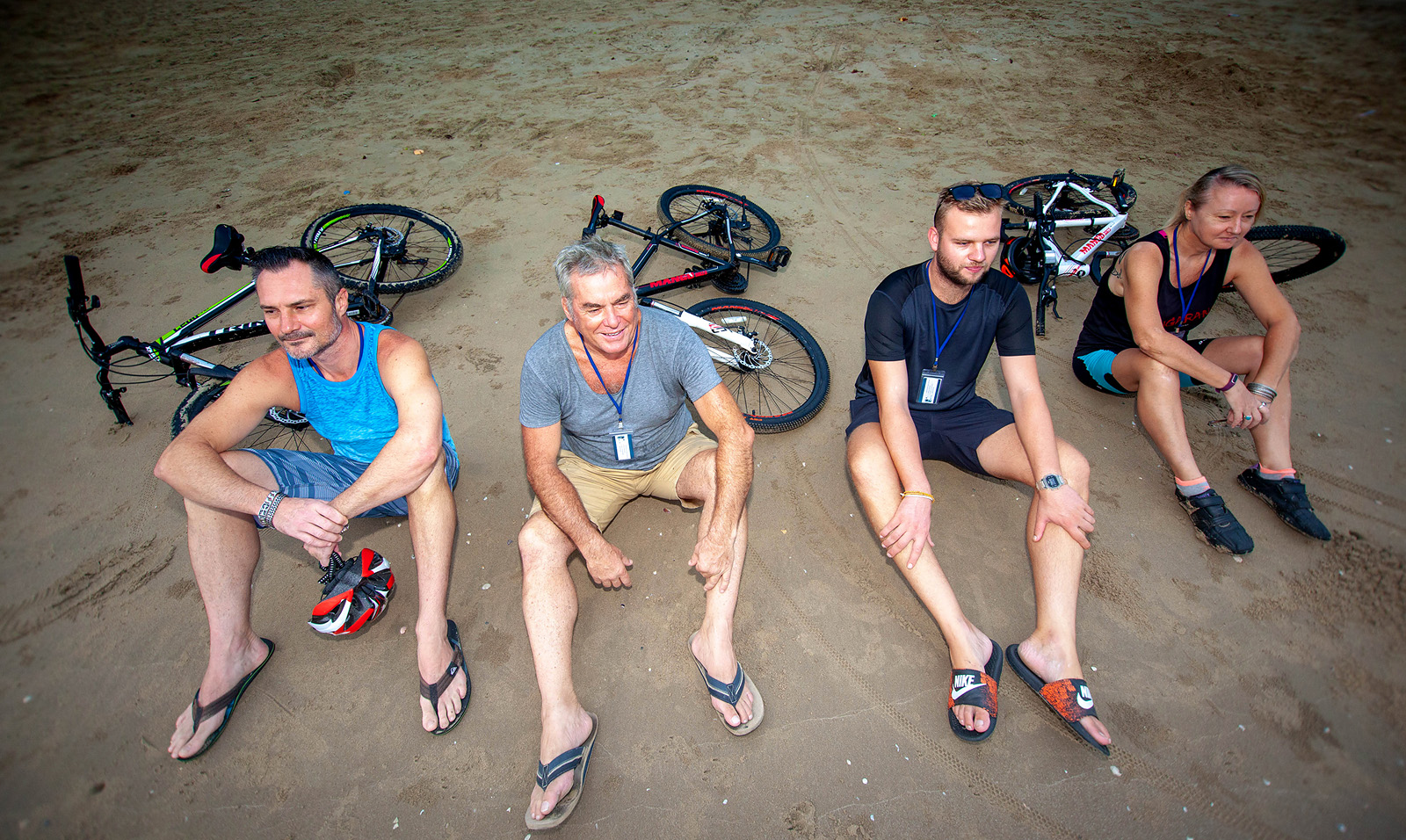
Osho Zorba the Buddha – Holistic rehab in thailand
Osho Zorba the Buddha
“Turning the impossible into possible”

"Detox from Drugs at a Luxury Holistic Center in Thailand and Israel"

Zorba and Buddha: A Journey to Wholeness and Balance
Zorba and Buddha, are two archetypes representing different aspects of human existence, are presented here as complementary entities leading together to a life of perfection and self-fulfillment. Zorba embodies passion, love and the vitality of life, while Buddha represents awareness, wisdom and the ability to live in the present moment.
"Holistic Center for Trauma, Addiction, and Mental Imbalance Treatment in Thailand"
“Come to the beginning of your journey to freedom from addiction to alcohol, drugs, and pills, and rediscover your life within the serene embrace of DaoTherapy Rehab in Thailand—where holistic healing meets empowering recovery.”
DaoTherapy Holistic Rehab
Key Elements of Drugs Detox:
Medical Supervision: Drugs detox must be conducted under medical supervision, as the body may experience withdrawal symptoms. These can include nausea, anxiety, muscle aches, and insomnia. A medical team will monitor and manage these symptoms to ensure the patient’s safety and comfort.
Holistic Therapies:
Holistic Therapies: Many detox programs incorporate holistic therapies such as mindfulness, yoga, and meditation to help individuals cope with stress and anxiety during the detox process. These therapies support the mind-body connection and contribute to overall recovery.
Tapering Process
Tapering Process: Drugs detox often involves a gradual tapering of the drug to reduce withdrawal severity. Doctors will slowly decrease the dosage over time to allow the body to adjust to lower levels of the substance.
Psychological Support:
Psychological Support: Like any addiction recovery process, detox from Drugs includes psychological support. This can involve counseling, therapy, or support groups to address the mental and emotional aspects of addiction.
Post-Detox Treatment:
Post-Detox Treatment: After completing detox, continuing treatment is crucial to prevent relapse. This often includes participation in ongoing therapy, group support, and the development of new coping strategies to maintain sobriety.
Zorba the Buddha
Osho emphasizes that a full and satisfying life requires a balance and integration of these two aspects. A Zorba without a Buddha may lack awareness and direction, while a Buddha without a Zorba may be cut off from the passion and vital energy of life. Only when we combine both, can we fulfill our full potential as human beings.
However, Zorba and Buddha are often seen as polar opposites, with Zorba being associated with passion and pleasure while Buddha is associated with detachment and liberation from worldly desires. The lecture seeks to bridge this gap and present the two aspects as complementary and mutually reinforcing.
The modern world tends to see Zorba as a marginal and irresponsible figure, while Buddha is seen as a role model for achieving inner freedom. However, as the lecturer points out, these two aspects are essential for a full human experience. Without Zorba’s passion and vitality, life becomes pointless and meaningless. Without the awareness and wisdom of Buddha, we can lose ourselves in a whirlwind of emotions and impulses.
The ultimate goal is to find a way to combine these two aspects within ourselves, to create a synthesis of Zorba and Buddha. This is a challenging task, as it requires us to deal with our inner tensions and contradictions. However, the lecture suggests that only by accepting this challenge can we reach a true sense of wholeness and meaning.
The path to integrating Zorba and Buddha begins with awareness of the existence of both aspects within us. We must acknowledge our passions, feelings and urges, as well as our ability to observe them with clarity and acceptance. It is a process of delicate balance, of giving expression to our vital energies while maintaining awareness and inner stability.
Ultimately, the combination of Zorba and Buddha represents the deepest aspiration of the human spirit – the aspiration to live a life of love and wisdom, of passion and awareness, of connection to self and others. It is an invitation to explore the complexity and richness of human existence, to embrace the inherent paradoxes and tensions in life and find a way to integrate them into an organic and meaningful whole.
The journey to discover Zorba and Buddha within us is a journey of liberation and self-realization. It is a journey that requires courage, honesty and willingness to face life’s inevitable challenges. However, as the lecturer testifies, this is also a journey of deep joy, of discovering the power and beauty inherent in each of us.
Ultimately, Osho invites us to adopt Zorba and Buddha as role models, as guides in our personal journey of self-discovery and self-realization. She suggests that by combining passion and awareness, love and wisdom, we can reach a deep sense of wholeness, of connection to ourselves, others and the ultimate essence of existence.

contact us
Contact us with your questions
We would love to speak with you! Feel free to reach out with any questions.

get in touch
Schedule a free consultation
Schedule a free consultation with our team and let’s make things happen!
Zorba and Buddha, two archetypes that seemingly represent opposite aspects of human existence:
Zorba and Buddha, two archetypes that seemingly represent opposite aspects of human existence, are presented here as complementary entities that when combined lead to a life of perfection and self-fulfillment. Zorba embodies the burning passion for life, the wild and tireless drive to experience the world in its full force, the intense love of life, pleasure and sensuality. It symbolizes spontaneity, turbulent creativity and the willingness to take risks and explore the limits of existence. In contrast, Buddha represents peaceful awareness, deep insight and the ability to stay in the present moment with complete acceptance. He embodies the wisdom of discernment, infinite compassion and recognition of the true nature of reality.
The lecture emphasizes that a full and satisfying life requires balance and harmony between these two aspects. A Zorba without a Buddha may be tempted to live a life of fleeting pleasures, be swept away by unbridled lust and indulge in constant thrills, without being able to recognize the deeper satisfaction that comes from self-knowledge and connection to the inner essence. He may experience extreme ups and downs, ranging between ecstasy and depression, without finding inner stability. On the other hand, a Buddha without a Zorba may distance himself from the physical world, detaching himself from natural passions and the simple pleasures that give life flavor and color. He may live an existence of distance and avoidance, immersed in detached contemplation that has lost touch with the primal drive and vitality underlying life.
Only when Zorba and Buddha find union and harmony within us, when Zorba’s fervor is balanced by Buddha’s calmness, can the full flowering of human potential be reached. Zorba gives us the courage to love without limits, to dare and fulfill ourselves, to celebrate the wonderful gift of life in every moment. Buddha allows us to contain these experiences in a space of clear awareness, to see the beauty and perfection in everything, to feel compassion and a deep connection to all beings. Together, they create a dynamic dance of full participation in life, alongside the ability to observe them calmly from a place of deep understanding.
However, the reality is that our society and culture tend to separate Zorba and the Buddha, placing them as opposing and impossible ideals to reconcile. Zorba is sometimes seen as an irresponsible and impulsive character, ruled by her passions and refusing to grow up. He represents the frightening and threatening side of existence, the wild and unleashed forces that may undermine the social order. In contrast, Buddha became a distant and unattainable ideal, a symbol of spiritual perfection and detachment from the material world. He is seen as someone who controls his emotions and impulses, as a model of self-discipline and restraint.
This split between Zorba and Buddha creates a deep rift within us, a feeling that we have to choose between two essential parts of ourselves. We feel that we must decide between a life of passion or a life of spiritual ascension, between self-fulfillment and service to others, between sensual pleasure and inner development. This conflict takes a heavy emotional and mental toll, leaving us with a sense of incompleteness and fragmentation.
But as the lecturer points out, the solution to this conflict lies precisely in a deep acceptance of both aspects and the ability to integrate them within us in an organic and creative way. We must learn to respect the Zorba and the Buddha within us, listen to the needs and longings of both without suppressing or neglecting either. It is a complex and delicate process of balance, which requires self-awareness, courage and patience. We must be ready to face the fears, doubts and dilemmas that arise along the way, and believe in our ability to find the right path for us.
The journey of uniting Zorba and Buddha begins with deep listening to ourselves, with a willingness to explore all dimensions of our being without judgment. We must develop an attitude of curiosity and compassion towards everything that is revealed within us – the urges, emotions, thoughts and feelings. We must identify the limiting patterns and beliefs that prevent us from living in harmony with ourselves, and at the same time cultivate the qualities that allow us to flourish – love, wisdom, compassion and courage.
Gradually, as we go deeper into this process, we discover that Zorba and Buddha are not two separate or opposing forces, but two aspects of the same underlying presence. The passion and awareness, the fervor and peace, the spontaneous participation in life and the ability to observe it with a broad view – all these become changing expressions of the same quality of full and present existence. We learn to flow between these different energies with flexibility and ease, reacting to each moment in an appropriate and creative way.
During this process, we may find that Zorba’s passion and spontaneity are given deeper direction and meaning by the wisdom and compassion of the Buddha. At the same time, Buddha’s awareness and serenity are filled with vitality and emotional intensity thanks to Zorba’s connection to the primal life energies. These two aspects become partners in a cosmic dance, violating and enhancing each other, creating a powerful synthesis that draws from the best of both.
It is a journey of true liberation, liberation from the shackles of fear, self-doubt and the illusion of separateness. As we go deeper into the union of Zorba and Buddha, we discover that we are much more than the sum of our parts, that we have an infinite depth of love, wisdom and creativity that seeks to be expressed in the world. We open up to new spaces of possibility, to new ways of experiencing and expressing ourselves, to relationships of harmony and true connection with those around us.
This journey requires a lot of courage from us, a willingness to look honestly inward and explore the less illuminated areas within us. He challenges us to expand the boundaries of our identity, to give up restrictive definitions and to adopt a more flexible and dynamic perception of the self. But the beauty is that at every step along the way, we get to taste the sweet fruits of freedom, of deep joy and of a true connection to our essence.
Ultimately, the combination of Zorba and Buddha within us is a gift to the entire world. The more each of us realizes this perfection, the inner harmony between desire and awareness, the more we contribute to the healing of the world. We become instruments of love and wisdom, are an inspiration and a role model for others, and shed light on the infinite potential that lies in the human heart.
This is an invitation to each and every one of us, to embark on this personal and collective journey of the union of Zorba and Buddha. It is a call to awaken to our perfection, to live a life of passion and meaning, of full participation in the celebration of life alongside a deep understanding of its essence. In this way, step by step, we can all become Zorvas and Buddhas walking on earth, fulfilling the promise inherent in human existence – to live, love and create out of freedom, perfection and infinite compassion.
Central insights of Osho:
1. Love without awareness is only half love, and life without love is half life.
2. When you are Zorba and Buddha together, you realize your greatest potential.
3. Zorba is Buddha’s love, and Buddha is Zorba’s awareness.
4. A Buddha without a zorba is like a tree without roots, unable to stand firm.
5. Zorba lived life with passion, while Buddha lived life with awareness.
6. Zorba and Buddha are seen as opposites, but in fact they complement each other.
7. The search for balance between Zorba and Buddha is the key to a full and meaningful life.
8. The complete person is the one who combines within himself the passion of Zorba and the wisdom of Buddha.
9. Life is a combination of celebration and awareness, of love and wisdom.
10. The fusion of Zorba and Buddha is the way to fully realize human potential.
Osho's practical advice:
1. Adopt Zorba’s passion for life and Buddha’s awareness.
2. Look for a balance between the heart and the head, between emotion and reason.
3. Don’t be afraid to live life to the fullest, while maintaining self-awareness.
4. Remember that love without awareness is lacking, and awareness without love is empty.
5. Focus on the present and the direct experience of life, while striving for wisdom and awareness.
6. Adopt an attitude of acceptance and compassion towards yourself and others.
Psychological Support:
Psychological Support: Like any addiction recovery process, detox from Subutex includes psychological support. This can involve counseling, therapy, or support groups to address the mental and emotional aspects of addiction.
Osho's self-talk mantras:
1. I embrace the vitality of Zorba and the clarity of Buddha.
2. I am looking for a balance between passion and awareness, between love and wisdom.
3. I live life to the fullest, while maintaining awareness and presence.
4. I accept myself and life as it is, in a spirit of acceptance and compassion.
5. I am open to the direct experience of life, and strive for transcendence and self-fulfillment.
Thought provoking questions:
1. How can you combine Zorba’s passion and Buddha’s awareness in your life?
2. Do you feel that you are living life to the fullest, or are there areas in which you feel stuck or limited?
3. What are the ways in which you can cultivate a balance between the heart and the head, between emotion and reason?
4. How can you use awareness to deepen your experience of life and your connection to yourself and others?
5. What can help you overcome the perceived gap between Zorba and Buddha, and see them as two complementary aspects of a complete human being?








